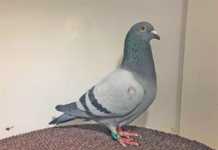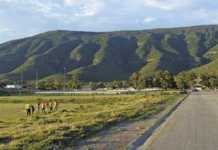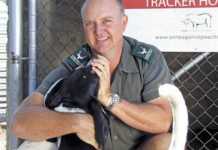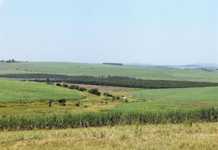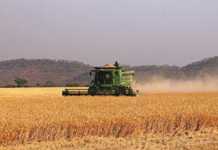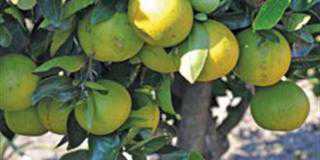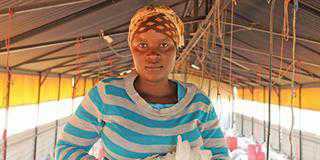1. Honourable men
The working year begins gently for me with borders of fever trees, red cannas and pink oleander. This is the road from Robertson to Bonnievale, a boulevard of beautiful wineries whose vineyards roll to the cool Breede River.
Hiking in the Rooikrans hills above Van Loveren winery about an hour later I meet a bearded man astride a sweating Arabian. “It’s beautiful up here,” he says as we look out across the green Robertson Valley stretching away to the Langeberge under a perfectly clear blue sky.
“Hopefully it looks the same tomorrow,” I say.
“You can bet on it.”
It’s 8 January, and I say I’m referring to the farm strikes planned for the following day. “Oh,” grunts the rider. “I didn’t even…You see, my mind just goes clear when I’m up here. I don’t think about that stuff.”
“Sorry.”
“It’s fine. I’ve been terribly stressed about it,” he says.
In a bid to make amends I tell him I’ve been meeting with farm worker union bosses these past few days and believe the union with members in the Robertson Valley is among the weakest. Even its leaders concede they’ll have difficulty convincing workers to stay away from work, let alone to run riot, as happened in November, following on from the spontaneous farm strikes an hour away in De Doorns.
“My sources,” I say, “tell me the strategy is to close down major roads, such as the N1, N2 and R62, but this is only likely to happen in De Doorns.”
The horseman winces. “De Doorns, you say? You know, the sad irony of that is there’s no money in table grapes. It’s hard enough making money in wine,” he tells me, and now I recognise him. He’s Stephen de Wet, owner and viticulturalist at the nearby Arabella stud and winery, a man responsible for many of my hangovers in years gone by.
When I mention this, my attempt at humour fails to break the sombre mood. With his horse already moving on down the trail, De Wet’s parting words are delivered over a shoulder. “You don’t farm for money any more in this country,” he says. “You only farm if it it’s something you truly love doing. That’s just the way things are now.”
I was left thinking that he was the second impressive and patently decent man I’d met that day, and how absurd it is that Stephen de Wet and Karel Swart are as likely to co-exist in peace as taxpayers are with SARS.
Swart is the general secretary of the Commercial, Stevedoring, Agriculture and Allied Workers’ Union (CSAAWU). I’d met him earlier on the Agter-Vinkrivier road, just behind Rooiberg winery. On the phone he’d always been extremely helpful and courteous. When we met in person, it was no different, even though I was late.
2. Dangerous days
Swart shook my hand warmly and introduced me to 30 or so men and women in blue overalls. We chatted briefly about what constituted reasonable and unreasonable expectations on the eve of the resumption of farm strikes in the Western Cape, and about which fears were legitimate and which were unfounded.
Swart candidly admitted that the decision taken by 10 or so farm worker unions to suspend the strike for December wasn’t unanimous, and he believes the industrial action has lost its energy as well as its spontaneity, and perhaps even its integrity as a result. As a result, it’s now more vulnerable than ever to political co-option.
He also said the donor-funded ‘princess unions’ (like the women-led Sikhula Sonke) that had decided not to take part in the strike are putting everyone – farmers, farm workers and union leaders – in a dangerous position.
“Things have to change, that’s obvious, and the best way to effect that change is short, unified, intensive action up and down the value chain – the sort of action that paralyses the country temporarily, but not critically,” he explained.
“Anything less will draw this confrontation out for months, possibly years, and will lead to frustration, which in turn will result in violence, mark my words.”
3. At war
When addressing the gathered workers, however, Swart is more forthright. “Ons is gewikkel in n oorlog,” he begins (We’re embroiled in a war), and he proceeds to lash out in every direction –
At the police for “acting like the private security force of the farmers”;
At Agri SA president Johannes Möller for “his dangerous and irresponsible threat that these strikes will lead to mechanisation on farms and the retrenchment of workers”;
And even at the NG Kerk, for “serving the agenda of the commercial farmer by saying nothing about the plight of farm workers.”
He concludes with the inevitable “Amandla!”
“Ngawethu!” comes muted response from the workers, who then stroll off in different directions.
4. De Doorns
On the way to De Doorns the following day, I stopped in Ashton, to ask where all the strikers were. “Back at work,” said a shop attendant. “About a hundred gathered this morning, but the farmer offered them a raise and they took it.”
He had the radio on and we listened to the newscaster warn of restive gatherings at Grabouw and De Doorns. Swart had professed his hope that the workers in the Koo area a little way beyond Montagu would come out in support of the strike, but a police cruiser travelling up and down the R318 had, with nothing more important to do, stopped to investigate the carcass of a large puffadder.
I arrived on the northern outskirts of De Doorns just before 11am to find the N1 had been closed by men employed by a company called Advanced Incident Normalisation. I did not stop to ask for information, because the obvious implication of a ‘normalisation’ crew being there was that things were not normal.
The scenes along the detour were peaceful – workers in the vineyards plucking plump, juicy-looking bunches of grapes – and I recalled how, a few nights before, a friend had quoted a line of poetic insight into modern-day fruit production by SA poet Basil du Toit, to the effect that when you bite into a piece of fruit these days, “you find that it has been half-expecting you.”
When I reached the T-junction with the N1, having passed through the peaceful town centre, I came upon approximately 3 000 people milling about on the road adjacent to the Stofland informal settlement, shouting abuse at a handful of police in riot gear standing around two Nyalas, looking fairly relaxed.
I parked behind the Nyalas, taking care to point the vehicle towards Cape Town, and walked towards the strikers. A consultation between the SAPS, the mayor and the strike leaders had clearly just ended badly, because an officer came hurrying back, shouting: “Hulle wil opmars na die dorp.” (They want to march on the town.)
The Nyalas were re-arranged into a spear-head barricade on the highway and a few more officers stepped out as the crowd started singing and dancing behind the locked hands of its leaders, a hodge-podge alliance of ANC councillors like Pat Marran, and businesspeople-turned-union leaders like Noseyman Pieterse of the Bawsi Agricultural Union of South Africa (Bawusa).
The group began to advance on the Nyalas, compelling camera-wielding journalists to scramble back behind the police line. Seconds later, with the strikers 30m from the police, a tear gas canister was thrown and the demonstration instantly became a riot.
To be cont…

